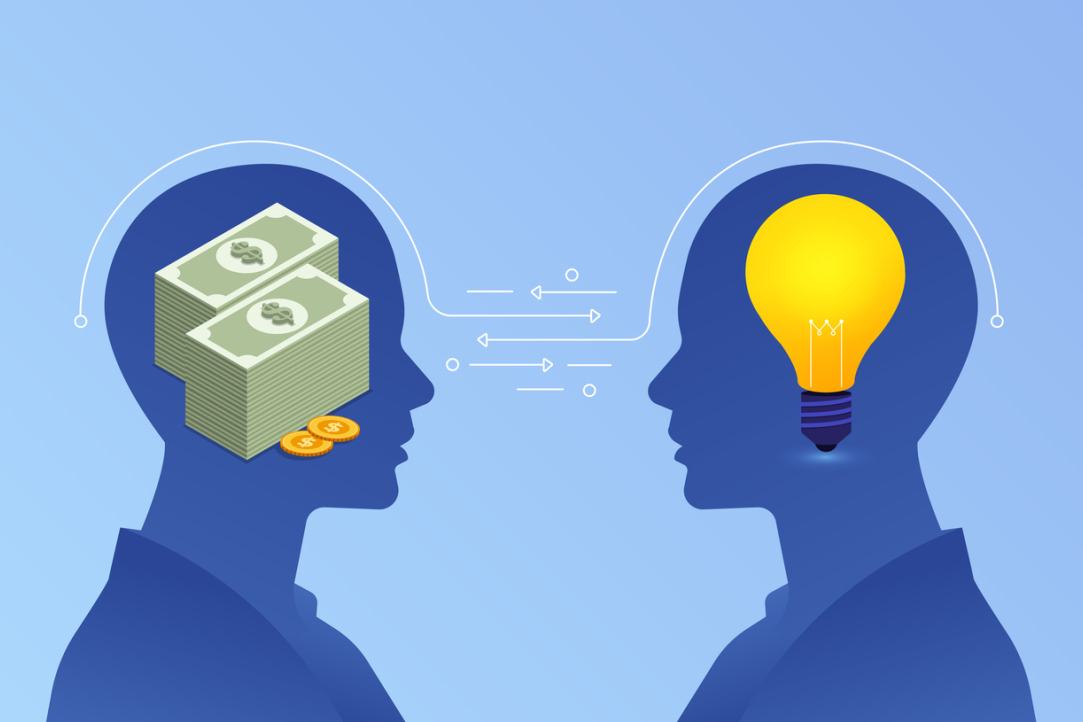Losing Money Multiple Times Causes Plastic Changes in the Brain

Researchers at the HSE Institute for Cognitive Neuroscience have shown experimentally that economic activity can actively change the brain. Signals that predict regular financial losses evoke plastic changes in the cortex. Therefore, these signals are processed by the brain more meticulously, which helps to identify such situations more accurately. The article was published in Scientific Reports.
The sight of an envelope from the tax authority, a falling currency rate, or a sad face of your chief accountant can mean impending financial troubles. How does the brain learn to recognize situations like this? Do these situations cause changes in brain function? These questions were studied by cognitive neuroscientists at HSE University using a popular economic game - the monetary incentive delay task (MID Task).
The MID Task requires that a person respond quickly to a signal that signals an opportunity to receive a reward or avoid a loss. It also allows you to divide brain mechanisms reward processing into separate stages: expectation of reward and learning.

Anna Shestakova,
Chief Research Fellow, Director, Centre for Cognition & Decision Making
We hypothesized that, like the plastic changes in the brain during the learning of a second language or playing a musical instrument, similar neuroplastic changes occur for certain signals that are associated with important economic outcomes. For example, the sound of a slot machine can for a long time be associated with a big win or loss while visiting a casino, which causes a particularly strong reaction in our brain in the future.
The subjects (29 people) took part in an economic game in which sound signals predicted losses of various sizes: the participants could lose between one and fifty-one monetary units in each round of the game. Participants had to quickly and accurately respond to audio signals to avoid monetary losses.
The study showed that participating in such a game leads to plastic changes in the auditory cortex of the brain, which begins to more accurately distinguish sounds that are associated with large financial losses. Moreover, scientists have demonstrated a link of this plastic change of the brain with the ‘learning signal’ generated by the human brain during performance of the MID Task. Subjects with a more pronounced neural ‘learning signal’ demonstrated stronger plastic changes in the nervous system.
The results of the experiment suggest that life's economic experience can lead to changes in the brain, which alters how external signals are perceived. Interestingly, the brain learns to identify important economic signals automatically. Moreover, scientists have shown precisely how this rewiring of the brain occurs and have demonstrated the role of individual differences in brain learning systems using the neurotransmitter dopamine.

Aleksey Gorin,
Junior Research Fellow, International Laboratory of Social Neurobiology
This is the first experimental evidence to show that economic activity can actively change the brain. Signals leading to financial losses evoke rather fast neuroplastic changes. Therefore, they are identified by the brain automatically, and do not require voluntary attention.
Aleksei Gorin
Junior Research Fellow, International Laboratory of Social Neurobiology
Anna Shestakova
Director, Centre for Cognition & Decision Making
See also:
HSE Researchers Discover Simple and Reliable Way to Understand How People Perceive Taste
A team of scientists from the HSE Centre for Cognition & Decision Making has studied how food flavours affect brain activity, facial muscles, and emotions. Using near-infrared spectroscopy (fNIRS), they demonstrated that pleasant food activates brain areas associated with positive emotions, while neutral food stimulates regions linked to negative emotions and avoidance. This approach offers a simpler way to predict the market success of products and study eating disorders. The study was published in the journal Food Quality and Preference.
HSE Neurolinguists Create Russian Adaptation of Classic Verbal Memory Test
Researchers at the HSE Centre for Language and Brain and Psychiatric Hospital No. 1 Named after N.A. Alexeev have developed a Russian-language adaptation of the Rey Auditory Verbal Learning Test. This classic neuropsychological test evaluates various aspects of auditory verbal memory in adults and is widely used in both clinical diagnostics and research. The study findings have been published in The Clinical Neuropsychologist.
Researchers at HSE Centre for Language and Brain Reveal Key Factors Determining Language Recovery in Patients After Brain Tumour Resection
Alina Minnigulova and Maria Khudyakova at the HSE Centre for Language and Brain have presented the latest research findings on the linguistic and neural mechanisms of language impairments and their progression in patients following neurosurgery. The scientists shared insights gained from over five years of research on the dynamics of language impairment and recovery.
Neuroscientists Reveal Anna Karenina Principle in Brain's Response to Persuasion
A team of researchers at HSE University investigated the neural mechanisms involved in how the brain processes persuasive messages. Using functional MRI, the researchers recorded how the participants' brains reacted to expert arguments about the harmful health effects of sugar consumption. The findings revealed that all unpersuaded individuals' brains responded to the messages in a similar manner, whereas each persuaded individual produced a unique neural response. This suggests that successful persuasive messages influence opinions in a highly individual manner, appearing to find a unique key to each person's brain. The study findings have been published in PNAS.
'We Are Creating the Medicine of the Future'
Dr Gerwin Schalk is a professor at Fudan University in Shanghai and a partner of the HSE Centre for Language and Brain within the framework of the strategic project 'Human Brain Resilience.' Dr Schalk is known as the creator of BCI2000, a non-commercial general-purpose brain-computer interface system. In this interview, he discusses modern neural interfaces, methods for post-stroke rehabilitation, a novel approach to neurosurgery, and shares his vision for the future of neurotechnology.
Smoking Habit Affects Response to False Feedback
A team of scientists at HSE University, in collaboration with the Institute of Higher Nervous Activity and Neurophysiology of the Russian Academy of Sciences, studied how people respond to deception when under stress and cognitive load. The study revealed that smoking habits interfere with performance on cognitive tasks involving memory and attention and impairs a person’s ability to detect deception. The study findings have been published in Frontiers in Neuroscience.
'Neurotechnologies Are Already Helping Individuals with Language Disorders'
On November 4-6, as part of Inventing the Future International Symposium hosted by the National Centre RUSSIA, the HSE Centre for Language and Brain facilitated a discussion titled 'Evolution of the Brain: How Does the World Change Us?' Researchers from the country's leading universities, along with health professionals and neuroscience popularisers, discussed specific aspects of human brain function.
‘Scientists Work to Make This World a Better Place’
Federico Gallo is a Research Fellow at the Centre for Cognition and Decision Making of the HSE Institute for Cognitive Research. In 2023, he won the Award for Special Achievements in Career and Public Life Among Foreign Alumni of HSE University. In this interview, Federico discusses how he entered science and why he chose to stay, and shares a secret to effective protection against cognitive decline in old age.
'Science Is Akin to Creativity, as It Requires Constantly Generating Ideas'
Olga Buivolova investigates post-stroke language impairments and aims to ensure that scientific breakthroughs reach those who need them. In this interview with the HSE Young Scientists project, she spoke about the unique Russian Aphasia Test and helping people with aphasia, and about her place of power in Skhodnensky district.
Neuroscientists from HSE University Learn to Predict Human Behaviour by Their Facial Expressions
Researchers at the Institute for Cognitive Neuroscience at HSE University are using automatic emotion recognition technologies to study charitable behaviour. In an experiment, scientists presented 45 participants with photographs of dogs in need and invited them to make donations to support these animals. Emotional reactions to the images were determined through facial activity using the FaceReader program. It turned out that the stronger the participants felt sadness and anger, the more money they were willing to donate to charity funds, regardless of their personal financial well-being. The study was published in the journal Heliyon.


